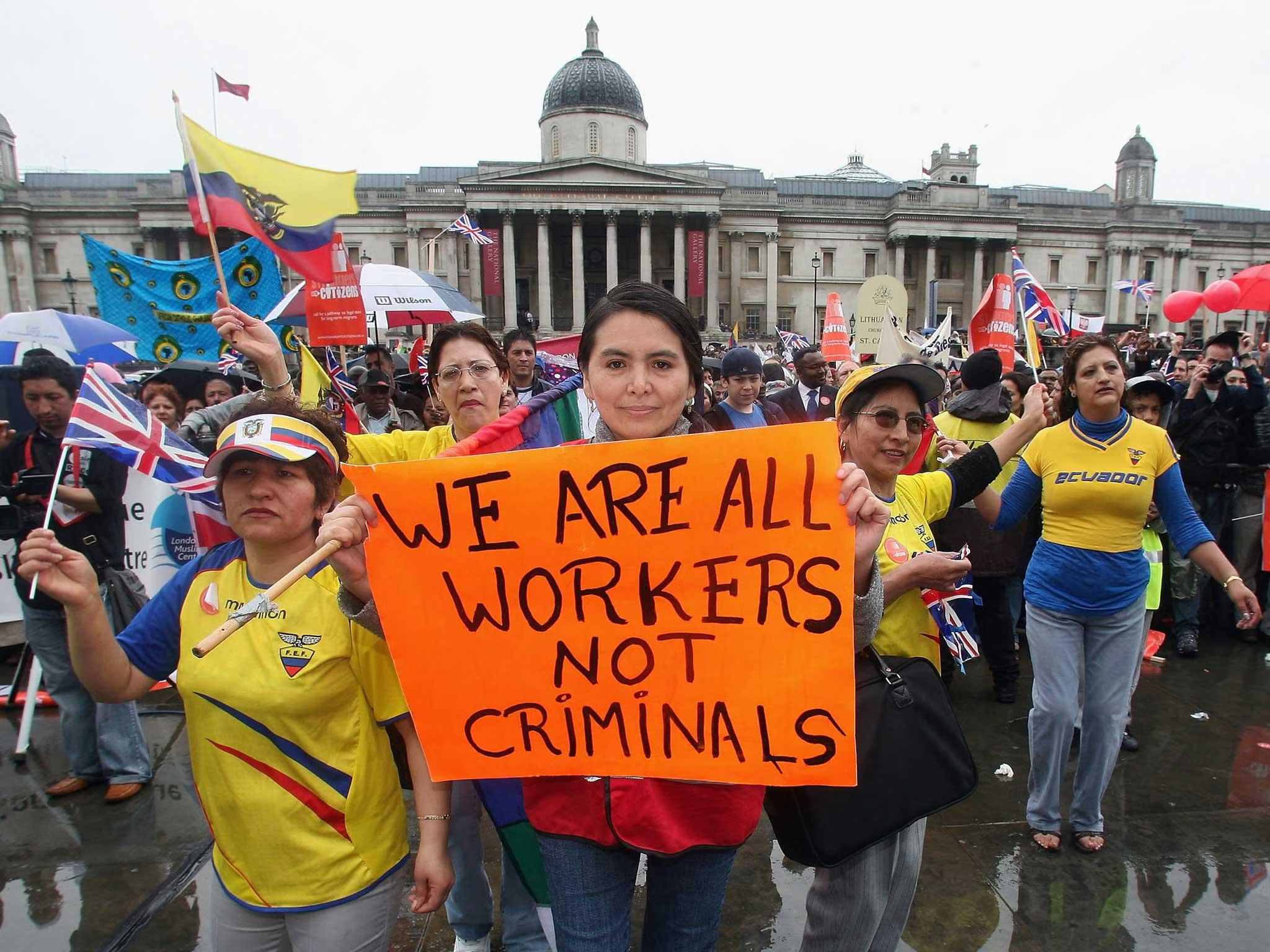Britain’s relationship with migrant workers has been a subject of intense debate, shaped by economic needs, political rhetoric, and social attitudes. As of 2025, the question of whether Britain needs migrant workers remains pivotal, with significant implications for the economy, public services, and societal cohesion. This article delves into the multifaceted role of migrant workers in the UK, exploring their contributions, the challenges they face, and the broader socio-economic and political contexts that shape their presence. Drawing on recent research, statistical data, and critical analysis, this expanded discussion uncovers hidden truths and provides a comprehensive understanding of the issue.
The Growing Presence of Migrant Workers in the UK
The UK’s labour market has become increasingly reliant on migrant workers over the past two decades. According to the Migration Observatory, the share of foreign-born workers in the UK workforce rose from 9% (2.6 million) in 2004 to 21% (6.8 million) in the first quarter of 2024. This significant increase reflects the UK’s growing dependence on international labour to fill critical gaps in various sectors. Since 2020, the non-EU foreign workforce has more than doubled, reaching 3.2 million, a trend that has fueled both economic growth and anti-immigrant sentiment.
Historical Context of Migration in the UK
Migration to the UK has a long history, from the post-World War II Windrush generation to the EU enlargement in 2004, which opened labour markets to Eastern European workers. Historically, the UK has adapted its immigration policies to meet economic needs, such as during the 2000 NHS expansion, which actively recruited foreign workers to address healthcare shortages. The post-Brexit points-based immigration system, introduced in 2021, shifted the focus to skilled workers, but sectors like social care and agriculture continue to rely heavily on migrant labour, often in roles considered low-skilled.
The Windrush generation, for instance, was instrumental in rebuilding post-war Britain, filling labour shortages in industries like transport and healthcare. Similarly, the EU’s eastward expansion in 2004 brought a wave of workers from countries like Poland and Romania, who took up roles in construction, hospitality, and agriculture. These historical patterns highlight a recurring theme: Britain’s economy has long depended on migrant workers to address labour market gaps, particularly in sectors where local workers are scarce.
Current Demographics and Trends
The composition of the migrant workforce has shifted significantly in recent years. While EU migration was high between 2012 and 2016, non-EU workers have driven recent growth, particularly post-Brexit and post-pandemic. Non-EU citizens now constitute the majority of the migrant workforce, with significant contributions from countries in Africa, Asia, and the Middle East. This shift is partly due to restrictive post-Brexit policies that ended free movement for EU citizens, coupled with increased demand for workers in sectors like health and social care.
In 2024, net migration to the UK reached 728,000, with many migrants filling critical roles in health and care sectors. The Office for National Statistics reports that one in four care workers and home carers in the UK is foreign-born, underscoring their importance to the social care system. However, this reliance has coincided with rising public and political scrutiny, particularly as immigration became a focal point in recent elections.
Economic Contributions of Migrant Workers
Migrant workers are integral to the UK’s economic prosperity, filling labour shortages, boosting productivity, and contributing to public finances. The Centre for Economics and Business Research estimates that zero net migration in 2022 would have led to a 0.94% drop in GDP by 2025, highlighting the economic cost of reducing migration. Migrant workers, particularly those on skilled-worker visas, contribute significantly to the public purse, with an average net contribution of £16,300 per migrant compared to £800 for the average UK-born citizen.
Filling Labour Market Gaps
One of the primary reasons for Britain’s reliance on migrant workers is the high rate of economic inactivity among the UK-born population. Over one in five working-age Britons are neither employed nor seeking work, often due to long-term ill-health, caregiving responsibilities, or lack of interest in certain roles. Migrants have filled these gaps, particularly in sectors like social care, agriculture, and construction, where local recruitment struggles. For example, the social care sector faced 152,000 vacancies in 2024, with migrant workers filling a significant portion of these roles.
In the care sector, migrant workers are essential due to an ageing population and increasing demand. Skills for Care projects that the sector will need an additional 440,000 roles by 2035 to meet rising demand. Without migrant workers, the sector’s chronic issues—low pay, high turnover, and poor working conditions—would exacerbate staffing shortages, compromising care quality.
Fiscal Impact and Economic Productivity
Migrant workers, particularly those from the European Economic Area (EEA), have historically made a net positive fiscal contribution. A 2018 Oxford Economics study found that EEA migrants contributed £2,300 more per person than they consumed in public services, while non-EEA migrants had a net negative contribution of £800, largely due to higher numbers of dependent children. However, the current immigration system, which prioritizes skilled workers and restricts access to public funds, ensures that most migrants contribute positively to the economy.
Beyond fiscal contributions, migrants enhance economic productivity by bringing diverse skills and perspectives. For instance, in the technology and gaming industries, employers recruit migrant workers to share specialized skills and keep pace with global innovation. This is particularly crucial in sectors where new roles emerge faster than the UK can develop relevant qualifications.
Challenges Faced by Migrant Workers
Despite their contributions, migrant workers face significant challenges, including exploitation, discrimination, and restrictive immigration policies. These issues not only affect workers’ well-being but also raise ethical questions about Britain’s reliance on migrant labour.
Exploitation and Precarious Work Conditions
Migrant workers, particularly those in low-skilled sectors, are vulnerable to exploitation due to restrictive visa conditions and inadequate labour enforcement. The Work Rights Centre reports that the UK’s employer-sponsored visa system ties workers to their employers, making it difficult to leave exploitative jobs without risking deportation. With only 60 days to find a new sponsor, many migrants endure wage theft, long hours, and unsafe conditions rather than report abuses.
A 2024 investigation by the Bureau of Investigative Journalism (TBIJ) revealed widespread abuses in the care sector, including wage theft, discrimination, and physical assaults. Migrant care workers, many of whom incur significant debts to migrate, feel trapped by visa conditions that give employers disproportionate power. For instance, one Zimbabwean care worker described returning home as a “death sentence” due to financial and personal sacrifices made to work in the UK.
The Gangmasters Licensing Authority (GLA), tasked with regulating labour providers, lacks the resources to prevent exploitation effectively. The Work Rights Centre notes that the Home Office conducts compliance visits to only one in 22 registered sponsors, allowing some employers to act with impunity. This systemic under-regulation exacerbates vulnerabilities, particularly in sectors like construction, hospitality, and social care.
Discrimination and Social Attitudes
Public attitudes toward migration are complex and often polarized. While younger people, university-educated individuals, and Labour voters tend to view immigration positively, anti-immigrant sentiment persists, particularly among Brexit “Leavers” and older demographics. The Brexit referendum highlighted concerns about free movement, with “Leavers” expressing more negative attitudes toward immigrants. The COVID-19 pandemic further complicated these dynamics, with media narratives oscillating between praising migrant healthcare workers and fueling anti-immigrant rhetoric.
Media representation often exacerbates negative perceptions. A 2016 Anglia Ruskin University study found that local media headlines frequently used negative connotations when discussing migrants, generalizing their impact without distinguishing between different types of migration. This lack of nuance contributes to public misunderstanding and hostility, which migrant workers experience as discrimination in workplaces and communities.
Impact of Immigration Policies
Post-Brexit immigration reforms, including the points-based system and increased salary thresholds, have made it harder for low-skilled workers to enter the UK. The abolition of the shortage occupation salary discount and restrictions on bringing dependants have particularly affected care workers, reducing their numbers and exacerbating sector shortages. These policies, introduced to curb net migration, have been criticized as a “crushing blow” to the care sector, which relies heavily on overseas workers.
The government’s focus on upskilling the domestic workforce through initiatives like Skills England aims to reduce reliance on migrant workers. However, experts argue that these plans will take years to yield results, and in the interim, sectors like social care will struggle without international recruitment. The restrictive visa system also increases the risk of exploitation, as workers with limited mobility are less likely to challenge abusive employers.
Public Opinion and Policy Implications
Public opinion on migrant workers is nuanced, with support varying by sector and skill level. British Future’s Immigration Attitudes Tracker shows strong public support for increasing migrant numbers in high-value roles like doctors and nurses (over 50% in favor) and significant support for care workers (54%) and agricultural workers (45%), despite their classification as low-skilled. This suggests that the public values migrants based on economic and social contributions rather than just skill levels.
Balancing Economic Needs and Public Sentiment
The government faces a delicate balancing act: addressing labour shortages while responding to public concerns about high net migration. The previous government’s policies, such as raising the skilled worker salary threshold to £38,700, aimed to reduce migration but have led to unintended consequences, such as increased vacancies in critical sectors. The current Labour government has signaled a focus on linking immigration to skills development, but short-term reliance on migrant workers remains unavoidable.
Public support for migration to meet economic and social needs provides an opportunity to move away from the “brightest and best” approach, which prioritized high-skilled migrants, toward a system that addresses shortages at all levels. However, political polarization—evident in differing attitudes among Labour, Conservative, and Reform voters—complicates policy-making.
Policy Recommendations
To address the challenges faced by migrant workers and maximize their contributions, several policy recommendations emerge from recent research:
Expand Labour Enforcement: The Gangmasters Licensing Authority’s remit should be expanded to cover sectors like construction and hospitality, with increased resources to ensure compliance and protect workers from exploitation. A single enforcement agency for agency labour could streamline oversight and reduce vulnerabilities.
Reform Visa Systems: The employer-sponsored visa system should be revised to allow greater worker mobility, reducing the risk of exploitation. Extending the 60-day period for finding new sponsors and simplifying visa processes could empower workers to leave abusive employers.
Regularize Undocumented Workers: A one-off regularization program for undocumented workers, similar to those in Greece and Spain, could integrate them into the formal labour market, ensuring fair wages and protections.
Address Sector-Specific Challenges: The social care sector requires targeted interventions, such as improving wages and working conditions, to attract domestic workers and reduce reliance on migrants. In the interim, visa routes for care workers should be maintained to prevent staffing crises.
Hidden Truths and Systemic Issues
Beneath the surface of Britain’s reliance on migrant workers lie several hidden truths. First, the narrative of migrants “taking jobs” from UK-born workers oversimplifies a complex reality. Employers often turn to migrants because local workers are uninterested in low-paid, high-intensity roles, or because the UK lacks sufficient training programs for emerging job roles. For example, the gaming industry has developed its own apprenticeships to address skill gaps, as traditional qualifications lag behind industry needs.
Second, the exploitation of migrant workers is not merely a byproduct of individual rogue employers but a systemic issue embedded in immigration and labour policies. The UK’s under-resourced labour enforcement system, with only a fraction of the inspectors recommended by the International Labour Organisation, fails to protect vulnerable workers. Data sharing between workplace inspectors and Immigration Enforcement further deters migrants from reporting abuses, perpetuating a cycle of exploitation.
Third, the economic contributions of migrant workers are often understated in public discourse. While media and political narratives focus on the costs of migration, such as pressure on public services, the positive fiscal impact—particularly of skilled and EEA migrants—is rarely highlighted. This selective framing fuels anti-immigrant sentiment and obscures the economic necessity of migration.
Case Studies: Migrant Workers in Key Sectors
Social Care
The social care sector exemplifies Britain’s dependence on migrant workers. With 152,000 vacancies in 2024 and an 8.3% vacancy rate—nearly three times the national average—the sector relies heavily on overseas workers, particularly from Africa and Asia. However, restrictive visa policies, such as the ban on bringing dependants, have reduced the sector’s attractiveness, increasing isolation and vulnerability among workers. The government’s long-term strategy to train domestic workers is unlikely to meet immediate needs, making migrant workers indispensable.
Agriculture
Seasonal agricultural work, such as fruit picking, has long relied on migrant labour, particularly from Eastern Europe. Post-Brexit restrictions have reduced EU worker numbers, leading to labour shortages that threaten food security. Public support for migrant agricultural workers remains strong, with 45% favoring increased numbers, reflecting recognition of their economic importance.
Healthcare
The NHS is a cornerstone of migrant worker contributions, with migrant doctors, nurses, and paramedics filling critical roles. During the COVID-19 pandemic, their sacrifices were widely publicized, with many losing their lives on the front lines. Despite this, visa extensions and public gratitude have not translated into systemic protections, leaving many healthcare workers vulnerable to exploitation.
Conclusion
Britain’s need for migrant workers is undeniable, driven by labour shortages, an ageing population, and economic demands. Migrant workers contribute significantly to the economy, filling gaps in critical sectors and boosting public finances. However, their exploitation, driven by restrictive visa systems and inadequate labour enforcement, reveals a darker side to this reliance. Public opinion supports migration for economic and social needs, but polarized attitudes and restrictive policies complicate the path forward.
To harness the benefits of migrant labour while addressing its challenges, the UK must reform its immigration and labour systems. Expanding enforcement, improving visa flexibility, and regularizing undocumented workers are critical steps. Simultaneously, long-term investments in domestic skills development can reduce reliance on migration without compromising essential services. By acknowledging the contributions of migrant workers and addressing systemic issues, Britain can build a more equitable and sustainable labour market that benefits all.
















0 Comments